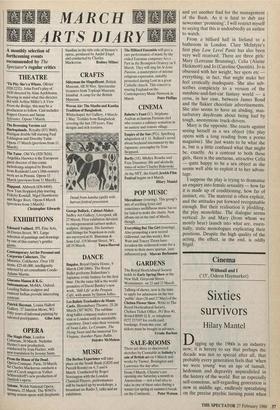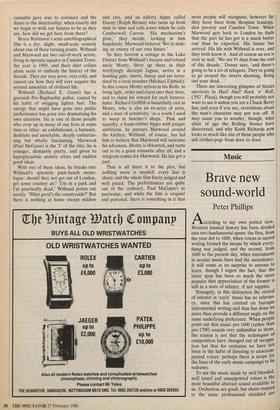Cinema
Withnail and I
(`15', Odeon Haymarket)
Sixties survivors
Hilary Mantel
Digging up the 1960s is an industry now; it is heresy to say that perhaps the decade was not so special after all, that probably every generation feels that 'when we were young' was an age of tumult, hedonism and depravity unparalleled in the history of the world. But an especially self-conscious, self-regarding generation is now in middle age, endlessly speculating on the precise psychic turning point when cannabis gave way to coronary and the demo to the directorship; when exactly did we begin to wish our futures to be as they are, how did we get here from there?
Bruce Robinson's semi-autobiographical film is a dry, slight, small-scale comedy about one of these turning points. Withnail and Marwood are two out-of-work actors, living in operatic squalor in Camden Town; the year is 1969, and their shirt collars alone seem to embody the history of the decade. They are very poor, very cold, and cannot see how they will ever acquire the normal amenities of civilised life.
Withnail (Richard E. Grant) has a greenish Pre-Raphaelite pallor, caused by his habit of swigging lighter fuel. The energy that might have gone into public performance has gone into dramatising his own situation. He is one of those people who crop up in many of our lives at some time or other: an exhibitionist, a fantasist, destitute and unreliable, deeply embarras- sing but wholly fascinating. Maywood (Paul McGann) is the 'I' of the title; he is younger, demurely pretty, and given to hypoglycaemic anxiety crises and sudden good ideas.
With one of these ideas, he breaks into Withnail's splenetic park-bench mono- logue: should they not get out of London, get some country air? 'I'm in a park and I'm practically dead,' Withnail points out nastily. 'What good's the countryside?' But there is nothing at home except mildew and rats, and an elderly hippy called Danny (Ralph Brown) who turns up from time to time and rolls joints which he calls Camberwell Carrots. 'His mechanism's gone,' they decide, looking at him hopelessly. Marwood believes 'We're mak- ing an enemy of our own future.'
So they borrow a cottage in the Lake District from Withnail's bizarre and rotund uncle Monty, drive up there in their terrifyingly decrepit Jaguar, arrive in a howling gale, starve, freeze and are terro- rised by a local poacher (Michael Elphick). In due course Monty arrives in his Rolls, to bring light, order and claret into their lives, and to claim his reward for such benevo- lence. Richard Griffith is beautifully cast as Monty, who is also an ex-actor of sorts, and a man of sensitivity: 'as a youth I used to weep in butcher's shops.' Pink and squashy, a foam-rubber hippo with priapic ambitions, he pursues Marwood around the kitchen; Withnail, of course, has led him to believe that Marwood will welcome his advances. Monty is thwarted, and turns out to be a great romantic after all; and a telegram comes for Marwood. He has got a part.
That is all there is to the plot, but nothing more is needed; every line is sharp, and the whole film finely judged and well paced. The performances are quite out of the ordinary, Paul McGann's in particular; and while the film is original and personal, there is something in it that most people will recognise, however far they have been from thespian leanings, dire poverty and Camden Town. When Marwood gets back to London he finds that the part he has got is a much better one than he expected. His future has arrived. His life with Withnail is over, and they both know it. And of course an era is over as well. 'We are 91 days from the end of this decade,' Danny says, 'and there's going to be a lot of refugees. They're going to go around the streets shouting, Bring out your dead ...'
There are interesting glimpses of Sixties survivors in Hail! Hail! Rock 'n' Roll, (`PG', Plaza), though you will probably not want to see it unless you are a Chuck Berry fan; and even if you are, revelations about the man's character may put you off. It may cause you to wonder, though, what elixir of age the Rolling Stones have discovered, and why Keith Richards now looks so much like one of those people who sell clothes-pegs from door to door.



















































 Previous page
Previous page